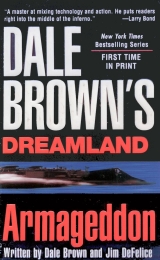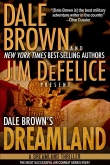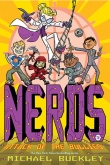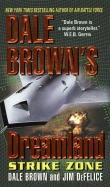
Текст книги "Armageddon"
Автор книги: Dale Brown
Жанр:
Боевики
сообщить о нарушении
Текущая страница: 3 (всего у книги 20 страниц)
But the imam did not berate him. He asked instead if he would like something to drink.
Sahurah declined, trying to hide his surprise. He glanced at the Saudi, but then turned his gaze back to the rug in front of him.
“The next phase of struggle has begun,” said the imam. He spoke in Arabic for the benefit of their visitor, who did not speak Malaysian. “You will go to Kota Kinabalu, and carry a message. It has been arranged”
Kota Kinabalu, on the coast below them, was a stronghold of the Malaysian government. It contained a police station and a small naval base. Until now, the imam had forbidden operations there—it was considered too well guarded by the Malaysian authorities.
He was being sent to become a martyr. For the first time in months, Sahurah felt truly happy.
“You will meet with a Malaysian, and you will bring back a message,” added the imam. “Specific instructions will meet you near your destination, as a precaution for your security. Do this successfully, and much glory will come to you. There will be other tasks”
Sahurah struggled to contain his disappointment. He bowed his head, then rose and left the hut.
Dreamland
7 October 1997, (local) 0432
“Dream Mover is approaching target area, preparing to launch probe units,” the airborne mission commander told Danny Freah over the command circuit.
“Acknowledged,” said Danny.
“Software’s up and running,” said Jennifer Gleason, hunched over a laptop next to Danny in the MV-22 Osprey. “Ten seconds to air launch.”
“Let’s get it going,” whispered Danny under his breath. “Launching One. Launching Two,” said the pilot.
Two winged canisters about twelve feet long dropped off the wings of the C-17. Their bodies looked more like squashed torpedoes than aircraft, but the unpowered rectangles were a cross between gliders and dump trucks. The canisters—at the moment they did not have an official name—were the delivery end of the Automated Combat Robot or ACR system, a cutting-edge force multiplier designed to augment the fighting abilities of small combat teams operating in hostile territory. As the canisters fell from the aircraft, two mission specialists aboard the C-17 took control of them, popping out winglets and initiating a controlled descent onto Dreamland Test Range C, five miles away.
Jennifer, monitoring the software that helped the specialists steer the canisters, began pumping her keyboard furiously as the screen flashed a red warning.
“Problem?” asked Danny.
“Ehh,” she said. “Sensor read won’t translate quickly enough.”
“Is it going to crash?”
“Hope not.”
“If he crashes it, three congressmen are going to tell everyone in America the system doesn’t work.”
“Not everyone in America,” said Jennifer, putting her nose closer to her keys.
Danny tried to relax. In his capacity as the head of the Whiplash ground team, he was responsible for the system being tested. It was his first—and so far only—program responsibility, and he shared it with two senior engineers. But as the ranking military officer on the project, he’d been the one to meet with the congressmen, the face VIPs liked to attach to a mission.
The congressmen were already in a bad mood. When they had insisted on seeing the Automated Combat Robot or ACR system in a “real live test,” they apparently didn’t realize that it was meant to operate at such an ungodly hour.
The event scenario was straightforward. A downed airman had just been located behind enemy lines by a search and rescue asset. Danny and two of his Whiplash troopers, aided by the robots, would rescue him from the clutches of Red, the enemy patrolling all around.
In real life, such a rescue would probably have been done with considerable force, or at least as much firepower as possible. There was basically no such thing as too much muscle in that situation, and the more boots—and guns—available, the better. But the more people in the package, the more things that could go wrong. ACR could make it possible to limit the exposure of the rescuers and increase the odds of success.
“They’re in. Okay,” said Jennifer. “Deployment. You’re looking good, Danny.”
“Ten minutes,” he told his men.
Down on the ground, the two gliding canisters had landed on the scrubby desert. Their sides had fallen away, disgorging a trio of ACR robots. The units were roughly two feet in length and were propelled by articulated tractor treads at both sides, an arrangement that allowed them to get over obstacles two feet high and avoid anything larger. Besides the small infrared and video cameras studding the units, the ACR robots carried what looked like a bouquet of pipe organs atop their chassis. These were reworked M203 forty-millimeter grenade launchers, which could be equipped with a variety of grenades, making the ARC units weapons as well as scouts.
The units began fanning out to form a perimeter around the downed airman. “Deployed without a problem,” reported Jennifer. “The Toasters are marching on.”
Danny winced at the nickname, hoping it wouldn’t catch on. He picked up his smart helmet and put it on, flipping down the visor, a display screen which could be tied into the ACR system, or any of several other sensor sets supplied through a special Dreamland system.
“Gear up,” Danny told his team. Then he began flipping through the ACR screens, looking for the four members of Red who were hunting his downed airman.
SERGEANT BEN “BOSTON” ROCKLAND, THE RED COMMANDER, smiled as he heard the drone of the approaching Osprey. Though it was still a good distance off, the aircraft had a very distinctive sound.
He turned and nodded to the ranger a few feet away. They’d decided not to use their radios, figuring that the Whiplash team might be able to home in on the signal. The ranger, another member of Red, lobbed a smoke grenade at the lumbering robot that was trundling toward them twenty yards away. As the grenade exploded, Boston saw that the ruse would work even better than he had hoped—the robot began peppering the air with its own smoke grenades, and provoked the robot to the north and south of it to start firing as well. The thick layer of smoke began drifting over the test range, obscuring the robots’ sensors.
“Bonzai!” yelled Boston, throwing off his vest and starting to run.
THEY USED ROPES TO GET OFF THE OSPREY QUICKLY. THE large blades of the aircraft’s engines whipped up the dirt, pelting the team with a mist of rocks. Danny got to the ground and spun to his right, hustling after his two men as they sprinted the fifty yards to their “airman.” One of the ACR units had engaged the Red unit to the north; from this point out it was going to be a jog in the park.
The whirling sand blocked Danny’s optical image momentarily, but as it cleared he saw his man a few yards away, standing in his shirtsleeves and waving his hand. His other team members had apparently detoured to protect the perimeter, so Danny went to his airman to tap him per the exercise rules and call the Osprey in for the pickup.
Except it wasn’t his airman.
“Bang bang, you’re dead,” grinned Boston, producing a pistol from behind his back. Its laser dot settled on Danny’s bulletproof vest, officially killing him. “Gotcha, Captain. Boy, if I only had a camera right now …”
Off the coast of Brunei
8 October 1997, (local) 0502
The stars had begun to fade from the sky, and the ocean swelled with the mottled shadows of the approaching morn. A solitary merchant ship cruised in the darkness, heading toward the capital of Brunei, Bandar Seri Begawan, which lay upriver from the Brunei Bay on the northern coast of the island of Borneo. The ship rode low on the waves with a load of motorbikes and electric goods, along with a variety of items ranging from Korean vegetables to American-style jeans.
Arriving on the bridge from his cabin, the captain of the ship noticed a shadow on the southwest horizon. He stared at it a moment, trying to make sense of it. The dark smudge moved with incredible swiftness, riding so low against the water that it could only be a wave or some sort of optical illusion; still, the captain went to the radar himself, confirming that there was no contact. His thirty years at sea had made him wary, and it was only when he looked back and saw nothing that he reached for his customary cup of coffee. He took a sip from his cup and listened as the officer of the watch described the expected weather. A storm had been forecast but was at least several hours away; they would be safely in the harbor by then.
“It is good that we are early then,” he told the others on the bridge in Spanish.
It was the last thing the captain said on this earth. For as he raised his cup of coffee to his lips, the missile that had been launched from the shadow in the distance exploded five feet behind him.
THE FRENCH-BUILT EXOCET MISSILE CARRIED A RELATIVELY small warhead at 364 pounds; while the explosion destroyed the bridge it would not by itself have been enough to sink the ship. The more damaging blow was landed by the second weapon, fired a bare second and a half after the first; this missile struck at the waterline just ahead of the exact middle of the ship. The warhead carried through the hull before exploding; the vessel shuddered with the impact and within moments began to settle. Nearly a third of the crew had been killed or trapped by the two blasts; the others were so stunned that it would be several minutes before most even got to their proper emergency stations. By then the ship would be lost.
Five miles away, the man who had given the order to launch the missiles stood over the small video screen, watching through a long-range infrared camera as the doomed merchant ship began to sink.
The attack had been an easy one; a bare demonstration of the Malaysian navy vessel’s capabilities. Named the Barracuda, the experimental high-speed craft was every bit the voracious predator, clothed in dark black skin made of metal and fiber-glass arranged in sharp facets to deflect radar waves. The craft used a technology known as “wing-in-surface-effect,” which allowed it to skim over the water at high speed; it could reach over four hundred knots, though to fire effectively it had to slow to below one hundred, and had to go even slower in choppy seas and bad weather. A one-of-a-kind vessel built in secret as part of a concerted effort to upgrade the Malaysian military, the Barracuda heralded a new age for the nation that spread out over more than a thousand miles of the southeastern Pacific.
A new age, and new opportunities, thought the vessel’s commander, Captain Dazhou Ti. He had great wishes for the future, and above all a lust for revenge against the family that had wronged his ancestors. The Barracuda would make it possible to achieve all of his goals.
Dazhou straightened, then looked around the red-lit command area of his vessel. The space was barely ten by twenty feet, and every inch was utilized. Eight men and the captain worked here; another two were assigned to the rear compartment as weapons handlers to watch over the automated equipment and, if the need arose, to work the thirty-millimeter cannon.
“A job well done,” he told his men.
The crew was well disciplined, and not one man looked up from his station or said the slightest word. This pleased Dazhou greatly.
“We will return,” he announced. “To your course, helm.”
The vessel began picking up speed instantly, slipping into the morning mist that hugged the coastline. Dazhou returned to his station at the center of the deck, mindful that he fired but the opening salvo in a long, long war.
II
“ W HAT I S G OING ON H ERE?”
Off the coast of Brunei
8 October 1997, (local) 0523
MACK SMITH BANKED HARD RIGHT, PUTTING THE A-37B Dragonfly at a right angle to the Megafortress’s radar. Had the radar been an older unit, he might have succeeded in confusing it. Pulse-Doppler radars had difficulty picking up returns from objects at a ninety-degree angle; many were the pilots who had managed to escape an enemy’s grip because of it. But the Megafortress unit wasn’t about to be fooled; the crewman aboard the EB-52 sang out loud and clear with his bearing and speed.
Hallelujah, thought Mack to himself.
It was probably the first time in his life that he actually wanted to be caught. Mack took a hard turn north and did a quick check of his instruments. The Cessna wasn’t a fancy beast, but it was sure and dependable, and the indicators showed she was in prime condition.
“Dragon One, this is Jersey,” said Breanna Stockard, who was aboard the EB-52. “Looks like we’re through with the low-altitude hunts. What’s your pleasure?”
Mack checked his watch and fuel. “Let’s move out to sea and practice some sea surveillance,” he answered. “That okay with Deci?”
Deci Gordon was a Dreamland radar specialist who was aboard the EB-52 helping train Mack’s men.
“Good for me,” answered Deci. “Your people did very well on the low-altitude stuff. A-pluses all around.”
He was being kind. The two pilots who had taken stints at the stick had flown decently. But the equipment operators tasked with finding Mack while he flew at low altitude around the nearby mountains had batted only about .300—great in baseball, fatal in war.
Mack knew that working the radar involved a heck of a lot more than hitting a few keys and jiggling some toggles, but his people had a long, long way to go before they would be competent enough to find a MiG hell-bent on nailing a real target.
Two weeks before, Mack would have vented his frustration at the poor score, or at least let the crew aboard the EB-52 know that they had to step it up. He was learning, however, to be more laid back, or at least more selective with his criticism.
He had to be. The two specialists aboard Jersey were the last two he had. The other two had quit.
As Mack adjusted his course and started to climb through five thousand feet, he saw something flare in the right side of his windscreen. It took a moment for him to realize he was seeing a fire.
“Jersey, this is Brunei Dragon One. I think I see a ship on fire. Stand by.”
Mack gave the throttle a shove and turned in the direction of the flames. From this distance, the fire looked more like the sparkle of a gem, glittering red. The ship itself was a gray shadow around it.
“Mack, we see it,” said Breanna. “We’ll have GPS coordinates in a second”
“You got a Mayday or something?” Mack asked Breanna. “Nothing”
Mack alerted his ground controller, who staffed a combat center at the International Airport control tower back in the capital. (As in many other smaller countries around the world, the International Airport or IAP handled military as well as civilian flights.) Besides calling out the navy and local harbor patrol, Mack told the controller to contact the Malaysian air force at Labuan. The small air station there—the only other air base besides Brunei IAP on the northern side of Borneo—operated a squadron of French-built Aerospatiale SA 316B Alouette Ills for search and rescue.
“We’ll stay in the area until rescue is underway, give ‘em some hope, anyway,” Mack added.
Breanna reported that the ship had not answered any of their hails.
“Roger that,” said Mack. He was now within two miles of the ship, and could see that the vessel had settled low in the water. “I’m going to get close and see what I can see.”
Low and slow was one thing the A-37B did really well. Mack decided to pop on his landing lights, not so much because it would help him see better, but because it would show survivors he was there and help was on the way. His speed notched down steadily until finally it seemed as if he were going backward.
As he approached, it looked to him as if there were two ships on fire. He banked, hand gentle on the stick as he slipped around for another look.
The ship had broken in half somewhere around the superstructure.
Must’ve been one hell of an accident for it to blow up like that, thought Mack, sliding around for another pass.
THE MEGAFORTRESS PILOT HAD FORGOTTEN TO TELL THE computer that the exercise was over, and so it kept blinking a warning at him that he was outside of the programmed flight area. It was nothing more than an annoyance, since the plane wouldn’t override the pilot’s commands, but the flash was driving Breanna crazy. Still, she avoided the temptation to turn it off herself, or even to bring it to his attention. In a few days she wasn’t going to be here to straighten him out; it was time to take the training wheels off.
But boy, it bothered her.
Finally, the pilot turned to her and announced: “I have a difficulty with the warning system.”
“It just needs to be acknowledged. Tell the computer the exercise is over. You might check your course, as well,” she added, noticing that he had allowed his heading to drift well to the west.
“Right. Yes,” said the pilot. He was in his late thirties, older than Breanna. Even so, he seemed nervous and jumpy; he didn’t have the been-there, done-that, I-remember-one-time-we-had-to-fly-backward-in-a-storm-with-one-engine calm most jocks pushing forty displayed. Not that he was a bad pilot; he just didn’t seem to have the hash marks his age implied.
Something else bugged her. The crew was, well, quiet.
In an American plane, certainly on a Dreamland crew, the specialists would be singing out, talking about contacts and the like. But the two men at the mission stations behind her on the flight deck were silent. Breanna’s copilot station allowed her to peek at their contact screens; she did so and saw that the men were refining their equipment and seemed to have a competent handle on things—they just didn’t talk about it.
By now, Mack had completed a third orbit of the stricken vessel and reported that he saw no boats in the water. He switched to a different frequency and began talking to the harbor patrol, which had been alerted by their ground controller.
“Captain, what do you think of this?” asked Deci. “Hit that two scan, low resolution. I’m feeding it.”
Enhanced by the computer, the image showed a dark blur in the left-hand corner of the screen, racing along the coast toward Malaysia.
“Just a ghost?” asked Breanna.
“No. There’s something there,” said Deci. “Moving real fast—out around three hundred knots.”
“What boat goes that fast? Cigarette speed boat?”
“Never heard of one even half that fast. Has to be a plane, but according to the radar it’s at three feet.”
“Three feet?”
“I know it’s weird,” added Deci, “but it’s a live contact. The computer has never seen it before”
“I’ll bet.” Breanna flipped into Mack’s circuit. “Brunei Dragon One, we have an odd contact you might want to know about,” she said. “Indications are it’s a plane flying very low, but it may be a weird radar bounce off a boat of some sort. Moving to the east, northeast at a very good clip. You might want to check it out.”
“Give me a vector,” he snapped.
* * *
CLEAN, THROTTLE LASHED TO THE LAST STOP, AND A GOOD wind at its back, the manual said the A-37B Dragonfly could do 440 knots.
Mack had it nudging 470 as he tracked in the direction Breanna had fed him, running up the coastline. He was about thirty seconds from the spot where she’d gotten the first contact just a hair under four miles—but he had nothing on his radar and couldn’t see anything, either.
He leaned his head far forward, as if the few inches of extra distance would help his eyes filter away the shadows and mist.
“Dragon One to Jersey—yo, Breanna, where is this thing?”
“Stand by.”
She came back again with a GPS location.
“Hey, I’m in the Stone Age, remember? I don’t have a GPS locator on board.”
“Sorry—you look like you’re almost on top of it. Two miles.” Mack reached for the throttle, easing off on his speed. The shoreline was an irregular black haze to his right.
Sixty seconds later, Breanna announced that they had lost it. “Stand by:’ she added.
Stand by yourself, he thought. He had let his altitude slip to two thousand feet. He was passing just over a marina, but moving too fast to sort out what he saw.
“Pleasure boat,” he said with disgust, snapping the speak button as he tucked into a bank to check it out. “Hey, Jersey girl—did you have me chase a pleasure boat? There’s a marina down here.”
“You know a pleasure boat that goes three hundred knots? Stand by. We’re looking for it.”
Mack circled around. There were at least two dozen boats in the marina, but no airplanes.
“Not a seaplane?” he asked, though he didn’t see one. “Seaplane? If so the computer couldn’t find it on its index. Hold on.”
Mack pulled out the large area map from his kneeboard and unfolded it, checking to see where he was.
“Dragon One, we have it twenty-five miles to your northeast, along the coast:’ said Breanna over the radio.
“Your sure about that, Jersey?”
“We’re as sure as—stand by,” she added, a note of disgust creeping into her voice.
Mack started a turn in the direction she had advised, but as he came to the new course Breanna told him they had lost the contact completely.
“Right,” he said.
“I’m sorry,” she said. “We’re trying.”
“I’m looking at empty ocean.”
“You’re right on the vector.”
She added that the Brunei authorities had just reported a ship underway to rescue survivors at the stricken ship, which had now been identified as a freighter due to dock at 6 A.M. in Brunei. Mack flew about ten miles to the east-northeast, then banked into an orbit fifteen hundred feet over the waves, riding a curlicue as he looked for Breanna’s contact. He began heading toward the masts of a group of fishing vessels further northward on the shore.
“Flight Jersey to Dragon One,” said the airborne radar operator aboard the EB-52. “Report: Two Su-27s coming in your direction from the south. Report: bearing one-six-five. Report ..
Mack listened incredulously to the contact information. The two planes were over Malaysian territory, on a course that would take them out over Mack’s position. But Malaysia didn’t have any Su-27s, and all eighteen of their MiG-29s were over at Subang, a good thousand miles away. As the MiGs were the most capable planes in the region, two spies at the airport there were paid good money by the prince to keep them informed.
Two others were paid so-so money. All of the air bases operated by Indonesia and Malaysia, including the two Malaysian and one Indonesian fields on Borneo, were covered around the clock by spies. Mack surely would have known by now if these planes were operating there.
Whoever they belonged to, they were moving at a good clip—the radar operator warned that they were topping six hundred knots.
“We’re sure they’re not MiGs?” asked Mack.
“Yes, Minister. We’re sure.”
“Yeah, those are definitely Su-27s, and they’re hot,” confirmed Deci.
“Roger that,” said Mack, pulling back on his stick and climbing off the deck.
BREANNA DID A QUICK RUN THROUGH THE SCREENS THAT showed how the Megafortress was performing, and then brought up the fuel matrix, which gave the pilots a set of calculations showing how long they could stay up with the fuel remaining in their tanks. The Megafortress computer system could make the predictions seem terribly precise-42.35 minutes if they spent it doing these orbits and then headed straight home—but in reality fuel management remained more art than science. The screen gave the pilots several sets of reasonable guesses based on stock mission profiles as well as the programmed mission. It could also make calculations based on data inputted. Breanna brought a “profile map” up at the side of the touchscreen and quickly built a scenario from it by tapping a few options. They could climb to twenty-five thousand feet, engage the two Sukhois, and then slide back home.
Just.
Not that they could actually engage the Sukhois. They weren’t carrying any anti-air missiles. They didn’t have any shells for the Stinger air-mine tail weapon; the shrapnel discs were in relatively short supply and weren’t needed for training.
“Captain, what are your intentions regarding the Sukhois?” she asked the Megafortress pilot.
He replied that he would remain on station until Mack gave him other orders. It wasn’t the wrong response, exactly, but it wasn’t exactly the sort of answer that was going to set the world on fire.
“Should we take the initiative and ask the minister what he wants us to do?” she said, her patience starting to slip a little. “Maybe suggest we try and establish contact with the bogeys and get them to declare their intent? Maybe prepare an offensive or defensive posture?”
“By all means,” answered the pilot. “But the minister may prefer to deal with them himself.”
“The A-37B is a sitting duck,” she said.
To her surprise, the pilot chuckled. “The minister would not lose an engagement,” he said.
“He’s unarmed.”
The pilot chuckled again, his laughter implying that she didn’t understand the laws of physics—or Mack Smith. The minister could not be shot down, and anyone foolish enough to attack him would get their comeuppance—even if they were flying cutting-edge interceptors and he was in an unarmed plane designed as a trainer.
Breanna, no longer able to contain her frustration, hit the talk button. “Dragon One, what’s your call on the Sukhois?”
“I want to see what the hell they’re up to and where they came from:’ replied Mack. ‘Because there are no Sukhois on Borneo. Malaysia’s MiGs are way over in West Malaysia near the capital.”
“Mack, I can assure you, those are Sukhois, not MiGs and not ghosts. Your people are not screwing this up. Those planes are coming hot. What are you going to do if they turn hostile?”
“Hey, relax Bree. I’m cool.”
“You’re a sitting duck. And they haven’t answered our radio calls. If they get nasty—”
“Oh, give me a break, will you? I can handle them.”
One’s loonier than the other, Breanna thought.
MACK CONTINUED HIS LACKADAISICAL CLIMB, TRYING TO conserve his fuel while making sure the pointing-nose cowboys running for him knew he was here. They were now about eight minutes away, flying at roughly twenty thousand feet, separated by about a quarter-mile. Their radars were not yet in range to see the Dragonfly.
But given their speed and direction, it seemed highly coincidental that they were flying in his direction on a whim. “Mack, you’re in radar range of the Su-27s.”
“About time,” he said.
“You want us to jam them?”
“Hell no! I want to see who these guys are.”
“THEY KNOW HE’S THERE,” DECI TOLD BREANNA OVER THE interphone. “Altering course slightly. They should be in visual range of Mack in, uh, thirty seconds,” said Deci.
“I’ll pass it along,” said Breanna.
“Radar—uh, they just turned on their air-to-air weapons,” said Deci. “They may really want to shoot him down.”
MACK CAME OUT OF HIS TURN ABOUT THREE SECONDS TOO soon, and had to push into his dive before he saw the first Sukhoi. He got a glimpse of it in his left windscreen, then heard the RWR complain that one of the fighters had switched on its targeting radar.
“I was afraid of that,” he groused out loud, as if the device could do anything but whine. A second later it gave another pitched warning, indicating that the enemy’s radar had locked on him and was ready to fire.
Then the unit freaked out, obviously a result of Breanna’s ordering the Megafortress crew to jam the airwaves so he couldn’t be shot down.
Mack sighed. A completely unnecessary order, even if her heart was in the right place. Mack pulled his plane into a tight turn and put himself right below the Su-27s as they turned. Separated by ten thousand feet and a good bit of momentum, all he caught on the gun’s video camera—rigged for the training exercises—was a gray blur. He pounded the throttle but there was no hope of keeping up with the Su-27s. Within two minutes, they were beyond his radar.
And he was short on fuel.
“Jersey, this is Dragon One. I’m bingo on fuel, headed for home”
“We’re close to our reserves, as well,” replied Breanna. “Did you get any sort of IDs on those Sukhois?”
“Negative,” said Breanna. “They had old-style N001 radars. Seem to be Su-27S models.”
The NOO1 was a competent but older radar type, and no match for the Megafortress’s ECMs or electronic countermeasures. It meant the planes themselves were relatively old and had been purchased second– or even third-hand. But it didn’t say who they might belong to. For the moment, at least, their identity would have to remain a mystery.
“Your seaplane didn’t show up?” he asked.
“I don’t think it was a seaplane.”
Probably not, thought Mack to himself. More than likely, his neophyte radar operators had bungled a routine contact with a speedboat, then sent him out on a wild goose chase.
He listened as Breanna updated the rescue situation—there were now two vessels conducting a search, with no survivors located as of yet.
“Time to pack it in,” he told the Jersey crew. “Head for the barn.”
He snapped off the mike, then did something that would not have occurred to him a few weeks ago.
“Hey, crew of the Jersey—I mean, crew of Brunei Mega-fortress One,” said Mack, touching his speak button. “Kick-ass job. Very, very good job. Attaboys all around.”
Kota Kinabalu, Malaysia
0853
Sahurah Niu’s feet trembled as he got off the motorcycle in front of the gate. The bike roared away and Sahurah was left alone. He tried to take a deep breath but the air caught in his throat and instead he began to cough.
As he recovered, a soldier walked up to him, gun drawn. “Who are you?” demanded the soldier, pointing the pistol at him.
“I was sent,” said Sahurah. The gun comforted him for a reason he couldn’t have explained.
“What is your name?”
Sahurah gave the name he had been told to use—Mat Salleh, a historical figure who had led an ill-fated uprising against the British on Borneo in the nineteenth century.
The soldier frowned and gestured that he should hold his hands out at his sides to be searched.
If I were carrying a bomb, Sahurah thought to himself, I would detonate it now and be in Paradise.
But he was not carrying a bomb, nor any weapon, and the search went quickly.
“This way,” said the guard, pointing to the gate. “The captain is waiting. You have a long journey ahead”








